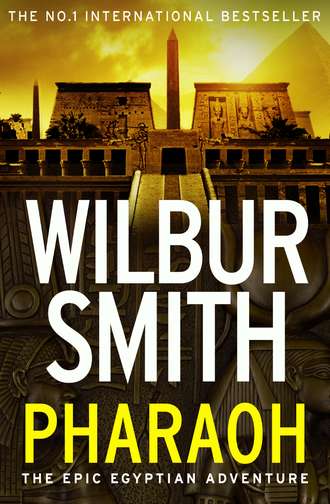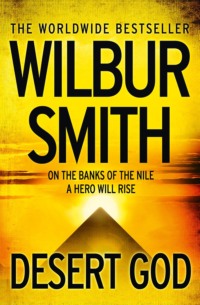
Полная версия
Pharaoh
Then they hoisted us on to their shoulders and carried us down to the banks of the Nile where the Lacedaemon armada was anchored, singing the songs of glory at the top of their voices until both Hurotas and I were well-nigh deafened by the cacophony. I must admit I thought little more of the childish antics of the new Pharaoh – there was too much of real import to occupy my mind. I thought that Hurotas and I had put him firmly in his place, and that we would not hear much more from him.
We went aboard the Lacedaemon flagship, where we were greeted by Admiral Hui. Although by then the tumultuous day had fled, and it was almost dark, we went immediately into planning the final chapter of our campaign against Khamudi, the leader of what remained of the Hyksos rabble in the northern delta of Mother Nile.
Khamudi had made his capital at Memphis, downriver from where we were now. My information on the state of Khamudi’s forces was extensive and up to date. My agents were well established in the Hyksos-occupied and -dominated territories of our very Egypt.
According to these agents, Khamudi had stripped his territory in northern Egypt almost bare of warriors and chariots and sent them all south to participate in what he had hoped would be the final drive to shatter the remnants of our Egyptian forces there. But, as I have already related, the timely arrival of King Hurotas had put an end to Khamudi’s grandiose aspirations. The great majority of the Hyksos forces now lay dead at the head of the pass below Luxor, a feast for the scavengers. There would never be another equally fortuitous opportunity to put an end to the Hyksos presence in our very Egypt than was ours for the taking right now.
What remained of the Hyksos army, foot and cavalry, were now with Khamudi in his capital city of Memphis in the northern delta of the Nile. They numbered not more than three thousand men in total, whereas Hurotas and I could field a total force of almost twice that number, including several hundred chariots. Nearly all of these were Lacedaemons, so despite the fact that I was indubitably the most experienced and skilled commander in Egypt and probably in the civilized world, nevertheless I felt I should as a matter of courtesy concede command of our combined forces to King Hurotas. I made my condescension apparent by inviting Hurotas to express his views as to how the second phase of our offensive should be conducted, which was as good as offering him supreme command.
Hurotas gave me that boyish grin I remembered from long ago, and replied, ‘When it comes to command, I bow to only one man, and he just happens to be seated at this very table opposite me. Please proceed, Taita. Let us hear your battle plan. Where you lead we will follow.’
I nodded my approval of his wise decision. Not only is Hurotas a mighty warrior, but he never lets his pride override his good sense. So I aimed my next questions at him: ‘Now I want to know how you suddenly appeared at Luxor without any of us, including the Hyksos, knowing of your arrival. How did you bring your flotilla of twenty large war galleys hundreds of leagues upriver, passing the Hyksos forts and walled cities to reach us here?’
Hurotas dismissed my question with a casual shrug. ‘On my ships I have some of the very best pilots that there are on this earth, not counting you of course, Taita. Once we entered the mouth of the Nile River we travelled only at night and tied up to the bank and hid under a camouflage of cut branches during the day. Fortunately the sky goddess Nut granted us a dark moon to cover our nightly progress. We passed the main enemy strongholds on the banks of the river after midnight, and we kept to mid-river. Perhaps a few fishermen saw us, but in the dark they would have taken us for Hyksos. We moved fast, very fast. We made the journey from the mouth of the River Nile to where we met you here in only six nights’ hard rowing.’
‘So then we still have the element of surprise on our side,’ I mused. ‘Even if a few of the enemy survived the battle at the pass, which seems unlikely, on foot they would take many weeks to find their way back to Memphis and spread the alarm.’ I jumped to my feet and paced the deck, thinking quickly. ‘Now what is absolutely vital when we attack Khamudi’s capital city is that none of the enemy manage to escape and somehow make their way eastwards to the border of Suez and the Sinai, and from there reach their ancestral homeland further east where they might be able to regroup and come against us again a few years hence – to repeat the same sorry cycle of war and conquest and enslavement.’
‘You are right, Taita,’ Hurotas agreed with me. ‘We have to finish this. Future generations of our people must be able to exist in peace and flourish as the most civilized nation in existence, without fear of the barbaric Hyksos hordes. But how might we best reach such a happy conclusion?’
‘I plan to use the bulk of the chariots as a blocking force along the eastern border to prevent any of the surviving Hyksos making a run for safety, to reach their ancient homeland,’ I told them.
Hurotas considered my proposal for just a few seconds before he smiled. ‘We are fortunate to have you, Taita. You are without doubt the most experienced and skilful charioteer that I know of. With you guarding the border I would not give any Hyksos a dog’s chance of making it back to his kennel.’
Sometimes I suspect my old friend Hurotas of ribbing me with his extravagant praise, but as on this occasion I usually let it pass.
By this time it was almost midnight; however, the darkness barely slowed our preparations for departure. We lit brush torches and by the light they afforded us we reloaded all the chariots aboard the Lacedaemon galleys. When this was done we boarded our men, including the remnants of my own native Egyptian regiments.
With this additional cargo the ships were so crowded that there was no room for the horses on board. I gave orders to the grooms to drive the loose horses northwards along the east bank of the Nile. Then, still in darkness, we pushed off from our moorings and headed downriver to enter Hyksos-held territory, with the leadsmen chanting the soundings in the bows and the pilots calling every twist and turn of the river. The trotting herds of horses almost kept pace with the speed of the flotilla, even though our ships had the favourable current to carry them onwards.
We covered almost thirty leagues of the voyage downstream before sunrise. Then we went ashore to rest through the heat of the day. Within a few hours the herds of horses had caught up with us, and were grazing on the pastures and the crops growing on the river-bank.
These crops had been planted by Hyksos farmers, for we were now in enemy-held territory. We thanked them for their generosity. And then we sent them to their places on the rowing benches of Admiral Hui’s galleys where the slave chains were buckled snugly on to their ankles. Their womenfolk were hustled away by Hurotas’ men; however, I made no enquiry as to what became of them. War is a brutal business, and they had come into our land without invitation, and seized the fields from our peasants and treated them worse than slaves. They could not expect to be treated any better by us.
When all was secure the three of us sat under the sycamore trees on the river-bank, while the cooks served us a breakfast of roasted sausage and crisp brown bread hot from the clay ovens, which we washed down with jugs of freshly brewed beer; and which I for one would not have exchanged for a banquet at Pharaoh’s board.
We went on board again as soon as the sun had passed its zenith and continued our northwards voyage towards Memphis. But there was still almost two days of sailing ahead of us, and this was the first time since Hurotas and Hui had returned so unexpectedly that I had been given the opportunity to speak to them about the life we had known together so many years ago. In particular I was anxious to learn about what had become of the two young princesses whom they had taken into exile with them when they fled from the wrath of the princesses’ brother, Pharaoh Tamose.
The three of us were seated on the poop deck of the flagship, and we were alone and well beyond earshot of any members of the crew. I addressed myself to both of them.
‘I have questions for both of you which I am sure you would rather avoid. You will remember that I had a special affection for the two beautiful young virgins that you coarse ruffians had the gall to steal away from me, their protector, and Pharaoh Tamose, their loving brother.’
‘Let me put your mind at rest, for I know just how it works, that lascivious Taita mind.’ Hurotas cut me off before I was able to put to him my first question. ‘They are no longer either young or virgin.’
Hui chuckled his agreement. ‘However, we love them more with every year that passes for they have proved themselves incomparably loyal, true and prolific. My Bekatha has given me four fine sons.’
‘And Tehuti has born me a single daughter who is lovely beyond the telling of it,’ Hurotas boasted, but I was sceptical of such claims because I am well aware that all parents have an inflated opinion of their own offspring. It was not until much later, when I laid eyes for the first time on Hurotas’ and Tehuti’s only daughter, that I realized that he had done her a serious injustice.
‘I do not expect that either Tehuti or Bekatha gave you messages to pass on to me.’ I tried not to sound wistful. ‘The chances of us meeting again were remote, and surely their memory of me has faded over the years …’ They would not let me complete my modest disclaimer before both of them burst out laughing.
‘Forget you?’ Hurotas demanded through his laughter. ‘It was only with the greatest difficulty that I convinced my wife to remain in Lacedaemon rather than to return to Egypt with us to find her darling Tata.’ It made my heart lurch to hear him mimic her exact rendition of my pet name. ‘She did not even trust me to memorize her messages to you, so she insisted on writing them down on a papyrus scroll for me to deliver to you in person.’
‘A papyrus!’ I exclaimed with delight. ‘Where is it? Give it to me at once.’
‘Please forgive me, Taita.’ Hurotas looked abashed. ‘But it was really too bulky to carry with me. I had to consider leaving it in Lacedaemon.’ I stared at him in dismay, trying to find the words to castigate him as severely as he deserved. He let me suffer only a little longer, and then he could contain himself no longer and he grinned. ‘I knew what you would think of that idea, Taita! So I have it in my saddlebags, which are in my cabin below.’
I punched his shoulder harder than was truly necessary. ‘Fetch it at once, you rogue, or else I shall never forgive you.’ Hurotas went below and returned almost immediately carrying a bulky scroll of papyrus. I snatched it out of his hands and carried it to the foredeck where I could be alone and uninterrupted. Gently and almost reverently I broke the seal and unrolled the first leaf so I could read the salutation.
Nobody that I know of can paint a hieroglyph as artistically as my beloved Tehuti. She had rendered ‘The Falcon With a Broken Wing’, which is my hieroglyph, so that it seemed to be endowed with a life of its own and fly from the painted sheet of papyrus through the mist of tears that filled my eyes, and go straight to my heart.
The words she wrote touched me so intimately that I cannot bring myself to repeat them to another living soul.
On the third morning after leaving our moorings below the city of Luxor our flotilla had reached a point only twenty leagues upstream of the Hyksos stronghold of Memphis, which stood on both banks of the Nile. There we beached our galleys, and we unloaded the chariots. The grooms drove up the horses and sorted them into their teams, and the charioteers buckled them into the traces.
The three of us held a final war council aboard the flagship of the Lacedaemon fleet, during which we once again ran over our plans in minute detail, covering every possible contingency that we might encounter during the assault on Memphis, then I embraced both Hui and Hurotas quickly but fervently and called down the blessing and favours of all the gods upon each of them before we parted company. I set off with my team of chariots for the head of the Red Sea to block the Hyksos escape route from Egypt, while the others continued their voyage northwards until they were in a position to launch their final assault on the stronghold of the Hyksos chieftain, Khamudi.
When Hurotas and Hui reached the harbour below the city of Memphis they found that Khamudi had already abandoned it and set fire to the shipping moored within its stone jetties. The pall of black smoke from the burning vessels was visible even to me and my charioteers waiting on the border of Egypt at Suez many leagues distant. However, Hurotas and Hui arrived in time to save nearly thirty of the Hyksos galleys from the flames, but of course we had not enough crews to man these valuable ships.
This is where my squadron of chariots came into play. Within only hours of taking up our stations along the border of Egypt with Suez and the Sinai we were hard at work rounding up the hundreds of refugees who were fleeing from the doomed city of Memphis. Of course each one of them was laden down with their valuables.
These captives were sorted carefully. The elderly and infirm were first relieved of all their possessions and then allowed to wander away into the Sinai Desert, after being charged never again to return to Egypt. The young and strong were roped together in gangs of ten, and then I started them back towards Memphis and the Nile still carrying their possessions and those of their compatriots who had been allowed to proceed. In the case of the men these captives, no matter how illustrious their rank, were destined to a short life chained on the rowing benches of our galleys, or labouring like beasts of burden in the fields on the banks of the Nile; whereas the younger women – those who were not too grotesquely ugly – would be sent to do service in the public brothels, and the rest of them would find employment in the kitchens or the dungeons of the great mansions of our very Egypt. The roles had been completely reversed, and they would receive the same treatment as they had dealt out to us Egyptians when they had us in their power.
When we reached the city of Memphis with these doleful lines of captives marching ahead of our chariots we found it under siege by Hurotas’ legions. However, chariots are not the most effective means of siege-breaking, so my dashing charioteers were dismounted and set to tunnelling beneath the walls to excavate a series of breaches to enable us to winkle out Khamudi and his rogues from their sullen lurking within the city.
Like all sieges this was a dreary and time-consuming exercise. Our army was forced to encamp outside the walls of Memphis for almost six months before, with a rumble and a roar, and a column of dust that was visible for many leagues around, the entire ramparts of the eastern section of the city collapsed upon themselves and our men could pour through the breaches.
The sack of the city went on for many more days for it was spread on both banks of the river. However, our victorious troops were at last able to apprehend Khamudi, where he and his family were found cowering in their hiding place deep in the dungeons beneath his palace. It was most fortuitous that they were sitting on a vast treasure of silver and gold bars, as well as innumerable large chests of jewellery that had taken him and his predecessors almost a century to collect from the enslaved Egyptian populace. This brood of royal rogues and rascals was escorted down to the harbour on the Nile by Hurotas’ troops, where to the accompaniment of music and laughter they were drowned one after another, beginning with the youngest members of the family.
These were a pair of twin girls of about two or three years of age. Contrary to what I had come to expect of the tribe they were not really repulsive to look at; in fact they were pretty little mites. Their father Khamudi wept as they were plunged into the Nile and held beneath the surface of the river. I was not prepared for that either. Somehow I had come to believe that, like all the brute animals, the Hyksos were incapable of loving and grieving.
The dreaded Khamudi himself was reserved for last on the execution roster. When his turn came he was accorded a more elaborate departure from this world than the others of his family. This began with skinning him alive using knives that were heated to a glowing red in charcoal braziers; followed by drawing and quartering, which evoked further merriment from the spectators. It seemed that Hurotas’ men have a particularly robust sense of humour.
I managed to maintain a neutral countenance during these proceedings. I would have much preferred to have taken no part in them, but had I absented myself it would have been seen as a display of weakness by my men. Appearances are vital, and reputations ephemeral.
Hurotas, Hui and I were subdued on our return to the Memphis palace. However, we soon became our usual cheerful and lively selves when we began counting and cataloguing the contents of the cellars beneath the palace of Khamudi. I find it truly remarkable how when all else in life has lost its flavour, gold alone retains its full fascination and appeal.
Even though we had fifty of Hurotas’ most trusted men to assist us, it took us several days to lay out all of this treasure. When at last we turned our lanterns upon this mass of precious metal and coloured stones the reflected light was strong enough to dazzle us. We stared at it in awe and astonishment.
‘Do you recall the Cretan treasure we captured at the fortress of Tamiat?’ Hurotas asked me in hushed tones.
‘When you were still a young captain of legionaries, and your name was Zaras? I will never forget it. I thought that there was not that much silver and gold in the whole wide world.’
‘That was not even one-tenth part of what we have here and now,’ Hurotas pointed out.
‘This is just as well,’ I replied
Both Hurotas and Hui looked at me askance. ‘How is that, Taita?’
‘That is because we have to share it at least four ways,’ I explained, and when they were still uncomprehending I went on: ‘You and Hui; me and Utteric Turo.’
‘You don’t mean Utteric, that utter prick, do you?’ Hurotas looked aghast.
‘Exactly!’ I confirmed, ‘Utteric the Great, the Pharaoh of Egypt. This treasure was originally stolen from his ancestors.’
They considered what I had said in silence for a while and then Hurotas asked tactfully, ‘So then it seems that you intend to remain in Utteric Turo’s realm?’
‘Naturally!’ I was taken aback by the question. ‘I am an Egyptian nobleman. I possess vast estates in this country. Where else would I go?’
‘Do you trust him?’
‘Who?’
‘Utteric the Utter Prick; who else?’ Hurotas demanded of me.
‘He is my Pharaoh. Of course I trust him.’
‘Where was your Pharaoh at the battle of Luxor?’ Hurotas asked remorselessly. ‘Where was he when we stormed these battlements of Memphis?’
‘Poor Utteric is not a warrior. He is a gentle soul.’ I tried to make excuses for him. ‘However, his father, Tamose, was a fine and furious warrior.’
‘We are discussing the son, not the father,’ Hurotas pointed out.
I was silent again while I contemplated the implication of his words; finally I asked, ‘May I take it, then, that you will not return with me to Luxor when I go to make my report to Pharaoh Utteric Turo?’
He shook his head. ‘My heart lies in Lacedaemon with the lovely woman who is my queen, and with our daughter. My business in Luxor is finished. Besides which, there are people in that city who still remember me as young Zaras. I have only met your Pharaoh Utteric Turo once, and he gave me no good reason to like or trust him. I think I would rather return to my own citadel where I have control of the situation.’ He came to me and clapped me on my shoulder. ‘My old friend, if you are as wise as we all believe you to be, you will give your share of this splendid treasure to me, to keep it safely for you until you call upon me to return it to you. In that case no harm will have been done. However, if I am correct in my suspicions you will have good reason to be thankful to me.’
‘I will think on it,’ I muttered unhappily.
Hurotas and Hui lingered another ten days while they loaded their ships with the slaves and other booty they had captured in Memphis, including my share of the Hyksos treasure which I had reluctantly agreed to place in Hurotas’ care. Then they sent their chariots and horses on board and we said our farewells standing on the stone jetty on the west bank of the Nile.
Four of Hui’s sons by Princess Bekatha were with us at Memphis. Each of them commanded a squadron of chariots. There had been little opportunity for me to become acquainted with them; however, it seemed they took after their father and their royal mother, and that meant to me that they were fine young men, and brave and skilful charioteers. The eldest was named Huisson for obvious reasons; and the other three were Sostratus, Palmys and Leo. Barbaric Greek names, to be sure, but they embraced me and called me ‘Revered and illustrious Uncle’ which endorsed my high opinion of them. They promised to convey my loving duty to their mother and their aunt immediately on their return to Lacedaemon.
Hurotas had written out the sailing orders for a voyage from the Nile Delta to the island of Lacedaemon; and this, together with a receipt for my share of the treasure of Memphis, he pressed into my hands. ‘Now you will have no excuse for failing to visit us at the very first opportunity that presents itself to you,’ he told me, his voice gruff as he tried to mask his distress at this our second significant parting.
On the other hand I had written a papyrus scroll for each of my two beloved princesses, Tehuti and Bekatha, for their husbands to deliver to them as soon as they reached their homes. I could not trust those two amiable ruffians to deliver verbatim my precious words to their spouses. These were expressions of such poetic beauty that, even after all these years repeating them silently to myself, can reduce me to tears.
Then all of them went aboard their galleys and pushed off from the pier. The drums beat the cadence for the rowers; the long oars dipped and swung and dipped again. In line ahead they unwound like some mighty sea dragon awakening, and with the Nile current urging them onwards they disappeared around the first bend in the river, heading for the delta where the river debouched into the great Middle Sea.
I was left alone and pining.
Three days later I went aboard my own galley and we headed southwards, homeward bound for the golden city of Luxor. But my heart was still heavy and my thoughts were travelling in the opposite direction to that in which the wind and the banks of oars were carrying me.
When we reached the port of Luxor below the city it seemed that the news of our magnificent victory at Memphis had been carried ahead of us by carrier pigeon to Pharaoh Utteric’s palace. Three of his senior ministers were waiting on the river wharf at the head of what appeared to be the entire population of Upper Egypt. In the background of this multitude there stood at least twenty wagons, each of them drawn by a team of twelve oxen. I presumed these were to carry the Hyksos treasure up to the city of Luxor where Pharaoh’s treasury, no doubt, stood ready and eager to receive it. A massed band of harps, flutes, lyres, trumpets, tambourines and drums were roaring out a spirited rendition of the new anthem to the glory of Pharaoh Utteric Turo, which it was rumoured he had composed himself. The Egyptian populace seemed to have stripped every palm tree in the land of its fronds which they waved enthusiastically as they chanted along with the bands.
When my flagship docked at the main wharf I was prepared to acknowledge the praise and grateful thanks of Pharaoh Utteric Turo and all the people of Egypt for ridding them of the menace of Khamudi and his ghastly tribe for all time and for returning to them such a fabulous treasure from the enemy coffers.








